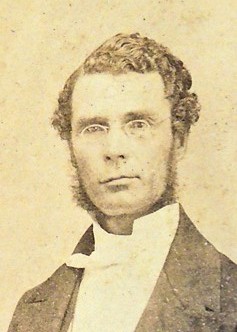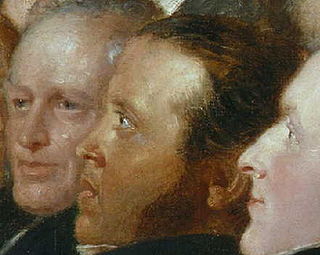Related Research Articles

The Caribbean Island of Jamaica was initially inhabited in approximately 600 AD or 650 AD by the Redware people, often associated with redware pottery. By roughly 800 AD, a second wave of inhabitance occurred by the Arawak tribes, including the Tainos, prior to the arrival of Columbus in 1494. Early inhabitants of Jamaica named the land "Xaymaca", meaning "land of wood and water". The Spanish enslaved the Arawak, who were ravaged further by diseases that the Spanish brought with them. Early historians believe that by 1602, the Arawak-speaking Taino tribes were extinct. However, some of the Taino escaped into the forested mountains of the interior, where they mixed with runaway African slaves, and survived free from first Spanish, and then English, rule.

The Baptist War, also known as the Sam Sharp Rebellion, the Christmas Rebellion, the Christmas Uprising and the Great Jamaican Slave Revolt of 1831–32, was an eleven-day rebellion that started on 25 December 1831 and involved up to 60,000 of the 300,000 slaves in the Colony of Jamaica. The uprising was led by a black Baptist deacon, Samuel Sharpe, and waged largely by his followers. The revolt, though militarily unsuccessful, played a major part in the abolition of slavery throughout the British Empire.

The Morant Bay Rebellion began with a protest march to the courthouse by hundreds of people led by preacher Paul Bogle in Morant Bay, Jamaica. Some were armed with sticks and stones. After seven men were shot and killed by the volunteer militia, the protesters attacked and burned the courthouse and nearby buildings. Twenty-five people died. Over the next two days, poor freedmen rose in rebellion across most of St. Thomas-in-the-East parish.

The emancipation of the British West Indies refers to the abolition of slavery in Britain's colonies in the West Indies during the 1830s. The British government passed the Slavery Abolition Act in 1833, which emancipated all slaves in the British West Indies. After emancipation, a system of apprenticeship was established, where emancipated slaves were required by the various colonial assemblies to continue working for their former masters for a period of four to six years in exchange for provisions. The system of apprenticeship was abolished by the various colonial assemblies in 1838, after pressure from the British public, completing the process of emancipation. These were the steps taken by British West Indian planters to solve the labour problems created by the emancipation of the enslaved Africans in 1838.

Queen Nanny, Granny Nanny, or Nanny of the Maroons ONH, was an 18th-century leader of the Jamaican Maroons. She led a community of formerly enslaved Africans called the Windward Maroons. In the early 18th century, under the leadership of Nanny, the Windward Maroons fought a guerrilla war over many years against British authorities in the Colony of Jamaica in what became known as the First Maroon War.

George William Gordon was a Jamaican businessman, magistrate and politician, one of two representatives to the Assembly from St. Thomas-in-the-East parish. He was a leading critic of the colonial government and the policies of Jamaican Governor Edward Eyre.

William Knibb, OM was an English Baptist minister and missionary to Jamaica. He is chiefly known today for his work to free enslaved Africans.

Francis Williams was a Jamaican scholar and poet who was one of the most notable free black people in Jamaica. Born in Kingston, Jamaica into a slaveholding family, Williams subsequently travelled to England where he officially became a British subject. After returning to Jamaica, he established a free school for free people of color in Jamaica.

Charles Rose Ellis, 1st Baron Seaford was a British politician, planter and peer.

Louis Celeste Lecesne, also known as Lewis Celeste Lecesne, was an anti-slavery activist from the Caribbean islands.

James Phillippo was an English Baptist missionary in Jamaica who campaigned for the abolition of slavery. He served in Jamaica from 1823 to his death, with some periods lobbying in England for funds to support his work on the island. He led the founding of several Free Villages, having gained funds to grant freedmen and their families plots of land for farming in villages independent of planter control. He also wrote and published three books about Jamaica.

The Crown Colony of Jamaica and Dependencies was a British colony from 1655, when it was captured by the English Protectorate from the Spanish Empire. Jamaica became a British colony from 1707 and a Crown colony in 1866. The Colony was primarily used for sugarcane production, and experienced many slave rebellions over the course of British rule. Jamaica was granted independence in 1962.

Cudjoe's Town was located in the mountains in the southern extremities of the parish of St James, close to the border of Westmoreland, Jamaica.
Three-Fingered Jack a.k.a. Jack Mansong, led a band of runaway slaves in the Colony of Jamaica in the eighteenth century.
Richard Hill (1795–1872), was a Jamaican lawyer and leader of the free people of colour, when they campaigned for equal rights in the early nineteenth century. In addition to his legal practice, Hill was also a naturalist, a poet, and an educator, as well as an administrator.
Robert Osborn (1800–1878) was a Jamaican newspaper editor and campaigner for equal rights for free people of color.
In Colonial Jamaica, during the 18th and 19th centuries, there were a number of newspapers that represented the views of the white planters who owned slaves. These newspapers included the Royal Gazette, The Diary and Kingston Daily Advertiser, Cornwall Chronicle, Cornwall Gazette, and Jamaica Courant. These newspapers often served parochial interests. The Diary and Kingston Advertiser served white residents in the city of Kingston and surrounding areas, while the Cornwall Chronicle and Cornwall Gazette catered to white planters and merchants in Montego Bay and surrounding areas. In 1826, two free coloureds, Edward Jordan and Robert Osborn, founded The Watchman, which openly campaigned for the rights of free coloureds, and became Jamaica's first anti-slavery newspaper. In 1830, Jamaican colonial authorities arrested Jordan, the editor, and charged him with constructive t. However, Jordan was eventually acquitted, and became Mayor of Kingston in post-Emancipation Jamaica.
Alexander Bravo, sometimes spelled Alexandre Bravo, was a Jamaican merchant, politician and planter who served as Auditor-General of Jamaica. Bravo was the first Jew to be elected to the House of Assembly of Jamaica.
Free black people in Jamaica fell into two categories. Some secured their freedom officially, and lived within the slave communities of the Colony of Jamaica. Others ran away from slavery, and formed independent communities in the forested mountains of the interior. This latter group included the Jamaican Maroons, and subsequent fugitives from the sugar and coffee plantations of coastal Jamaica.
Dominican nationality law is regulated by the 1978 Constitution of the Commonwealth of Dominica, as amended; the Citizenship Act, and its revisions; and various British Nationality laws. These laws determine who is, or is eligible to be, a national of Dominica. Dominican nationality is typically obtained either on the principle of jus soli, i.e. by birth in Dominica; or under the rules of jus sanguinis, i.e. by birth abroad to parents with Dominican nationality. It can also be granted to persons with an affiliation to the country, or to a permanent resident who has lived in the country for a given period of time through naturalisation. There is also, currently a program in Dominica for acquiring nationality by investment. Nationality establishes one's international identity as a member of a sovereign nation. Though it is not synonymous with citizenship, for rights granted under domestic law for domestic purposes, the United Kingdom, and thus the commonwealth, have traditionally used the words interchangeably.
References
- ↑ "Champions of Emancipation – Jamaica Information Service".
- ↑ "Jordon, Edward | Encyclopedia.com".
- ↑ Mavis Campbell, The Dynamics of Change in a Slave Society (London: AUP, 1976), p. 156.
- ↑ Campbell, Dynamics of Change, p. 157.
- ↑ James Thome and J.H. Kimball, Emancipation in the West Indies: a six months' tour in Antigua, Barbadoes and Jamaica in the year 1837 (1838), p. 359.
- ↑ Campbell, Dynamics of Change, pp. 95-8.
- ↑ Campbell, Dynamics of Change, p. 157.
- ↑ "Jordon, Edward | Encyclopedia.com".
- ↑ Campbell, Dynamics of Change, p. 156.
- ↑ Frank Cundall, Richard Hill, The Journal of Negro History, Vol. 5, No. 1 (Jan. 1920), p. 38.
- ↑ C.V. Black, A History of Jamaica (London: Collins, 1975), p. 183.
- ↑ "Jordon, Edward | Encyclopedia.com".
- ↑ "Champions of Emancipation – Jamaica Information Service".
- ↑ Lennox Honychurch, The Caribbean People, Book 3 (1979), p. 87.
- ↑ Black, A History of Jamaica, pp. 156-7.
- ↑ Honychurch, The Caribbean People, Book 3, p. 88.
- ↑ "Edward Jordon".
- ↑ "Champions of Emancipation – Jamaica Information Service".
- ↑ Black, A History of Jamaica, p. 157.
- ↑ "Champions of Emancipation – Jamaica Information Service".
- ↑ "Jordon, Edward | Encyclopedia.com".
- ↑ "Edward Jordon".
- ↑ "Edward Jordon".
- ↑ "Champions of Emancipation – Jamaica Information Service".
- ↑ Campbell, Dynamics of Change, p. 155.
- ↑ Campbell, Dynamics of Change, p. 155.
- ↑ Honychurch, The Caribbean People, Book 3, p. 88.
- ↑ "Jordon, Edward | Encyclopedia.com".
- ↑ "Jordon, Edward | Encyclopedia.com".
- ↑ "Edward Jordon".
- ↑ Black, A History of Jamaica, p. 170.
- ↑ "Jordon, Edward | Encyclopedia.com".
- ↑ "Jordon, Edward | Encyclopedia.com".
- ↑ "Champions of Emancipation – Jamaica Information Service".
- ↑ The Watchman - The Story of Edward Jordan. YouTube . Archived from the original on 9 December 2021.